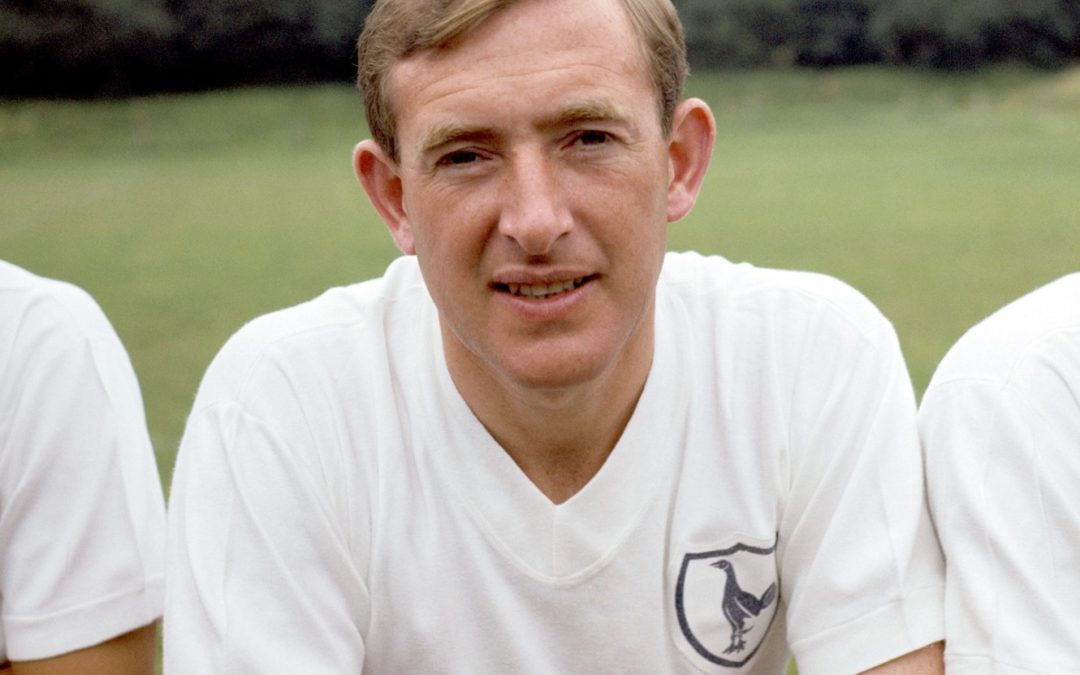The Danny Blanchflower Story
BY Vince Cooper
A supremely gifted player and a superb captain, Northern Ireland’s Danny Blanchflower undoubtedly played a huge part in Tottenham’s early 60s triumphs. His playing career was highlighted by skippering the side to the memorable double success but his influence and deep thinking left it’s mark on the game in many ways.
Blanchflower was never afraid to say what was on his mind, or speak up on behalf of fellow footballers and he went a long way towards changing the image of players. He was perhaps the first ‘Thinking man’s footballer’ of the modern age.
Twice named the Football Writers Association ‘Footballer of the Year’, the right-half famously said ‘no’ when offered the chance to appear as a subject of the ‘This Is Your Life’ television show and much preferred the limelight to shine on other members of that great Spurs double team.
Robert Dennis Blanchflower was born in Dunraven Park, Bloomfield, Belfast on 10 February 1926, the eldest of five children of a shipyard worker who worked at the famous Harland and Wolff and a mother, Selina, employed in the rope works and a player for the factory team.
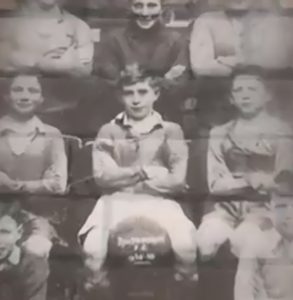
School captain
Danny attended the local Ravenscroft School and won a general education scholarship to Belfast College of Technology but left early to become an apprentice electrician at the Gallaher’s cigarette factory.
An avid footballer from an early age he would often play three times on a Saturday, for his school, for the Boys Brigade and for Bloomfield United, a team he started with a group of friends.
When the 2nd World War broke out Danny’s dad John went to fight in France and with the rest of the family evacuated the youngster initially joined the Air Training Corps and was also a cycle messenger for the ARP, joining in 1941 at the age of 15. Then in 1943 he lied about his age and applied to join the R.A.F.
Whilst awaiting call-up he was awarded a scholarship to St Andrews University and would spend a year in Scotland studying maths, physics and applied kinematics, whilst also earning a place in the University football team and starting what would become a lifelong passion for golf. Good marks in his studies led to him being recommended for a commission in the General Duties branch of the R.A.F.
Danny was sent to Manitoba in Canada for training as a navigator and football was forgotten until he returned to England, seeing out the last months of his service in East Anglia as a hut mate of future acting legend Richard Burton among others
Given Christmas leave in 1945, he was immediately contacted by Glentoran and after a ‘brilliant’ game for the reserves against Ards, was given his first-team debut against Belfast Celtic on 29 December 1945, a 3-1 defeat.
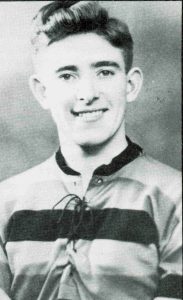
Danny of Glentoran
Blanchflower returned to Belfast after being demobbed in April 1946 and resumed his job at Gallaher’s whilst quickly rebuilding his reputation on the football pitch. Having initially signed for Glentoran as a 15-year-old before leaving when he realised he was too slight to play against fully-grown men, he rejoined the club he had supported as a youngster and played in a handful of games before the end of the season notching his first goal in a 3-1 defeat to Distillery. A report in the Belfast News Letter wasn’t completely taken with the newcomer, saying that he ‘showed promise’ but adding that he was ‘slow at times’.
Blanchflower was unable to get into the team at the start of the 1946-47 campaign but he broke through in September and soon earned a regular place in the Glen’s line-up.
Once he was in, he was in to stay, appearing a total of 126 times over the next three seasons and notching seven goals.
He appeared in two Irish Cup finals for his team but was on the losing side both times, first in a 1-0 defeat to Belfast Celtic in 1947 and then when Derry City ran out 3-1 winners in 1949. Sadly, he never got to play at Glens famous Oval home as it had been bombed in 1941.
Grosvenor Park was the home ground during Danny’s time at the club with The Oval, after extensive rebuilding, reopening at the start of the season after he left the club.
By the end of the 1948-49 season Blanchflower had proved his worth in Ireland and a number of English clubs were reportedly interested in bringing him across the Irish Sea. In the summer of 1949 he made the switch with Barnsley manager Angus Seed winning the race for his signature and parting with a cheque for £6,000. With promising youngsters Billy Bingham and Jimmy McIlroy coming through at the club, Glens clearly felt it was the right time to allow their 23-year-old wing-half to move on.
So Danny started his English career, and was soon joined by his seven-years-younger brother Jackie who signed as an apprentice with Manchester United.
In Yorkshire the older Blanchflower quickly established himself in the first team. He spent almost two seasons at Oakwell and it was here that a willingness to speak his mind first came to the fore with a number of criticisms of manager Seed, mostly for not allowing the team to spend enough time training with the ball.
Blanchflower recalled one confrontation with Seed where he asked the manager why they couldn’t train with the ball more.
“We think if you don’t see it during the week you might want it more on Saturday”, said Seed to which Danny replied; “If we don’t see it during the week we might not recognise it on Saturday”.
Despite the troubles with his club boss he clearly impressed right away and was picked for his Northern Ireland debut at Windsor Park on 1 October 1949.
It wasn’t an auspicious start on the international stage. Blanchflower’s Barnsley teammate, goalkeeper Patrick Kelly in particular had a nightmare match as Scotland romped to an 8-2 win.
Danny’s opinion of his own performance that day was scathing. “I wandered around that field in a trance”, he would later say, adding: “I slipped furtively away feeling that my international career had ended the day it begun”.
But whilst it did prove to be the end for Kelly who was never chosen for his country again, Blanchflower would quickly become a fixture in the team although, perhaps luckily for him, he was left out of the next match, a 9-2 hammering at the hands of England. He returned for the goalless draw with Wales at Wrexham, and was rarely out of the team after.
Meanwhile, the Oakwell experience lasted just under two seasons with Blanchflower’s regular falling outs with Seed leading to him putting in a transfer request. First Division strugglers Aston Villa moved in with a bid of £15,000 on 15 March 1951 and completed the deal the day before the transfer window closed, giving the Tykes a healthy profit.
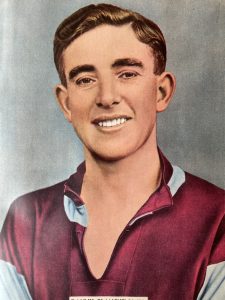
At Aston Villa
When he moved to Villa Park his new team was level on points at the bottom of the table but after inspiring Villa to a 3-2 win over Burnley on his debut, Danny helped them pull clear over the last ten games, to finish in the relative comfort of 15th place.
The Villa Park team enjoyed a much better season in 1951-52 and reached the quarter final of the FA Cup in ‘52-‘53.
As with his time at Barnsley, Blanchflower eventually became disillusioned with training methods at Villa and had a number of arguments with Eric Houghton who had taken over as boss in 1953. This would eventually lead to his departure although he once again made his team a healthy profit.
Placed on the transfer list at his own request in October 1954 he missed a month following an injury playing for his country against Scotland. Villa’s price-tag of £40,000, later reduced to £35,000 for the now-27-year-old seemed to put most teams off. When he returned to the team in early December, Arsenal sent assistant manager Jack Crayston to watch him and this led to boss Tom Whittaker putting in an offer of £30,000 whilst admitting that he felt others would bid more.
Villa vice-chairman Joe Broughton said a few days later that the Gunners, Spurs, Wolves and Sheffield Wednesday were the clubs in the running but none had met his team’s valuation and that he still hoped the player would withdraw his request.
After Blanchflower made it clear that he wouldn’t change his mind, Villa asked clubs for their final offers and it was Spurs who won the bidding race with an offer of £32,000 setting a new transfer record for the Londoners topping the team’s previous highest purchase by a healthy £15,000.
When he moved to White Hart Lane, Blanchflower was joining a team in need of some rebuilding. The title-winning side of 1950-51 was now ageing and had finished 16th in 1953-54.
He signed on December 8th with the team coming off a 3-1 home defeat to Everton which left them in 18th and just a point clear of the relegation places and he went straight into the side three days later for the trip to Manchester City which finished in a goalless draw.
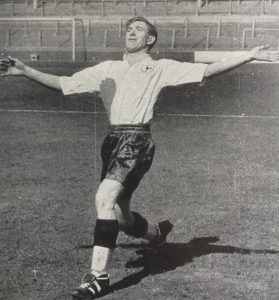
Early days at Spurs
Spurs ended up climbing clear of the relegation places and repeated their 16th-place finish of the previous campaign.
By this time Danny was a regular in the Northern Ireland team and for the March 1954 win over Wales at Wrexham he was joined in the line-up by brother Jackie, by now a regular at Manchester United. In November of that year he was handed the captaincy by manager Peter Doherty for the 2-2 draw with Scotland at Hampden Park and he would skipper his country for the rest of his international career.
Towards the end of the 1954-55 campaign Spurs boss Arthur Rowe who had already taken an extended break due to ill-health, stood down from the post and Jimmy Anderson, who had been at the club since joining as a groundstaff boy in 1908, took over.
Anderson was thought of as a stop-gap whilst Bill Nicholson learned the trade as coach before stepping up. But he stayed in the role for three years and led the team to an FA Cup semi-final appearance in 1956 but there were more disagreements with the manager for Blanchflower.
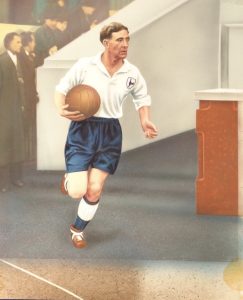
Danny leads his team out
By now skippering the side, Danny wanted to make decisions during the match and when Spurs were a goal down to Manchester City in the semi-final he swapped defender Maurice Norman and inside-forward Johnny Brooks as they searched for an equaliser. It never came, leading to Captain and Manager arguing in the dressing room after the match was over.
A few weeks later the Irishman made another in-match switch in the home game with Huddersfield which Spurs lost 2-1 after being a goal up to leave them hovering just above the relegation places and he was dropped.
Well at least Blanchflower said he was dropped. Manager Anderson claimed he was suffering from knee and thigh injuries before the crucial encounter with Cardiff but Danny responded; “This is ridiculous, I’m definitely fit”. Spurs got the point they needed to ensure 1st Division survival.
Before the final game of the season Anderson announced that he had relieved Blanchflower of the captaincy, saying: “Harry Clarke will take over.
“I cannot give the captain permission to alter the team during matches unless there are injuries”.
The former skipper was restored to the line-up for the final day 3-1 win over Sheffield United which condemned the Blades to relegation and saw Spurs finish the season in 18th. Ironically Clarke had to miss that match through injury so Bobby Smith took over as skipper – and scored a hat-trick.
The summer of 1956 was full of speculation about what might happen at White Hart Lane. Would Anderson stand aside for Nicholson. Would Blanchflower, now 30, be moved on again?
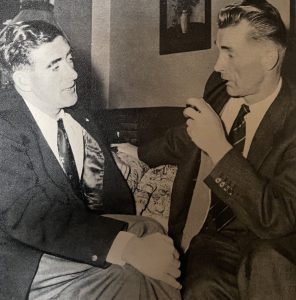
With Northern Ireland manager Peter Doherty
In the end neither happened and the right-half was restored to the captaincy by his veteran manager with new signing, Welshman Terry Medwin scoring twice in the 4-1 opening day win at Preston and the team making rapid improvement and finishing runners-up to Manchester United’s Busby Babes, who, with Danny’s brother an occasional starter, won the title and were only denied the double by a double strike from Peter McParland, another Northern Ireland star.
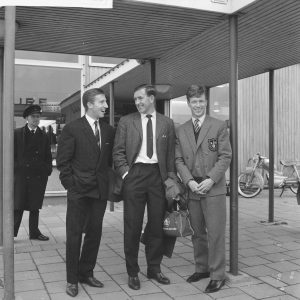
Cliff Jones, Danny and John White
Blanchflower and Spurs again contended at the top of the table in the 1957-58 season with the right-half making 42 appearances and the team finishing third although 13 points behind runaway winners Wolves. The team also added another Welsh international in Cliff Jones, who, like Terry Medwin before him, arrived from Swansea but it was Blanchflower who took the plaudits with the Footballer of the Year award coming his way at the end of the campaign.

Victory over England at Wembley
On the international front Danny skippered his country to a famous victory over England at Wembley in 1957 and the following summer he led them at the World Cup finals in Sweden.
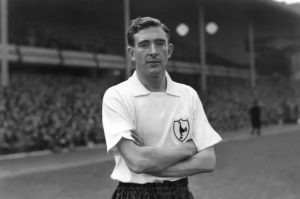
Qualification hadn’t been straight forward. They had kicked off the three-team group with a draw in Portugal and after defeat to Italy in Rome, their hopes looking remote.
But they beat Portugal 3-0 at home leading to a deciding return match with the Italians. The game was originally set for 4 December in Belfast but it had to be postponed when heavy fog left Hungarian referee Istvan Zsolt and his linesmen stranded in London and unable to get to the match.
The teams played a friendly with Irish officials instead. When the decision was announced to fans it was met with loud boos and the match was played in a bad atmosphere from the start. Italian right-half Giuseppe Chaippela was sent off after he took a running jump at McParland and Blanchflower was forced to help escort the Italians off the pitch at the final whistle after a 2-2 draw as an angry crowd invaded.
The World Cup qualifier was replayed in mid-January 1958 and a 40,000 crowd saw Northern Ireland, despite missing goalkeeper Harry Gregg whose flight from Manchester was cancelled due to fog, record a famous 2-1 win to qualify for Sweden.
In the finals Peter Doherty’s team were grouped with West Germany, Czechoslovakia and Argentina.
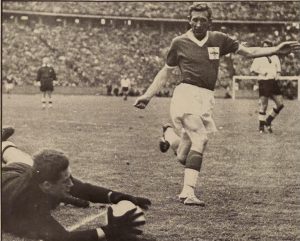
In Sweden against West Germany
After kicking off with a 1-0 win over the Czechs the Irish lost 3-1 to Argentina which left them needing a result from their final match against the World champions. They battled to a 2-2 draw to force a play-off rematch with Czechoslovakia.
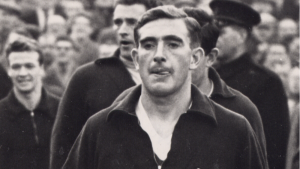
Leading out Northern Ireland
On a dramatic night in Malmö, Peter McParland proved the hero, equalising in normal time after the team had fallen behind then grabbing an extra-time winner to send Danny and his team through to the last eight.
But the quarter-final was their fifth match in 11 days and an injury-hit and short-handed (the Irish had only taken 17 men to Sweden) team unsurprisingly lost 4-0 to France to bring their brave run to an end.

Johnny Haynes, Stanley Matthews and Danny
Blanchflower returned to White Hart Lane for the 1958-59 season and on 11 October, fifteen minutes before kick-off of the home match against Everton, Spurs announced that, due to ill-health Jimmy Anderson was stepping down as manager and that Bill Nicholson would be replacing him with immediate effect.

With Spurs boss Bill Nicholson
And it appears that Nicholson had an immediate effect as Spurs thrashed their opponents 10-4 to set a new club record and indeed a new mark for the aggregate amount of goals in a 1st Division match.
But Danny and his team spent the season struggling near the foot of the table and finished 18th although Nicholson did add an important player towards the end of the campaign with the March 1959 arrival of Dave Mackay from Hearts.
Two more Scots were added with goalkeeper Bill Brown joining from Dundee and then John White moving from Forfar after both Mackay and Blanchflower urged Nicholson to sign him.
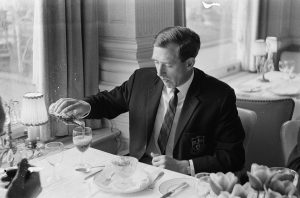
The new arrivals brought about a huge improvement in the 1959-60 campaign with Blanchflower leading Nicholson’s team to 3rd place just two points adrift of Champions Burnley and with only a late-season slump costing them the title.

When the following season started Blanchflower was approaching his 35th birthday, although over the last two seasons he had been playing the best football of his career and certainly the energy of Mackay at left-half along with the pinpoint passing accuracy and vision of John White at inside-right surely made his job easier.
Blanchflower’s role was clearly defined. It was his job to provide the link between the defenders and White, along with bringing wide men Jones and Medwin into play.
Spurs began the campaign with a 2-0 home win over Everton thanks to goals from Les Allen – another key 1959 signing – and the prolific Bobby Smith.
And after that well, they just kept winning. Blanchflower skippered his men to 11 consecutive successes before a home draw with Manchester City where they were denied a 12th by a disputed decision when the referee stopped Les Allen from scoring – and gave Spurs a free-kick.
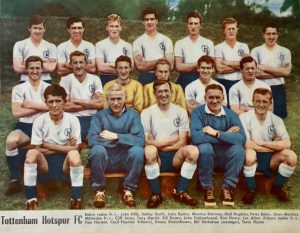
The double winners
They bounced straight back to win their next match 4-0 at Nottingham Forest and had built a healthy seven-point lead at the top of the table deforestation losing at second-placed Sheffield Wednesday in November.

Champions
The next defeat came in January at Old Trafford by which time Spurs held a healthy ten-point advantage and had also started their quest for F. A. Cup glory with victory over Charlton Athletic at White Hart Lane.
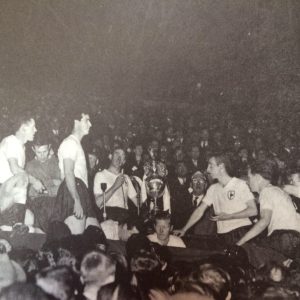
Collecting the trophy
Spurs weren’t just winning; they were winning handsomely. A phenomenal 115 goals were scored with Danny bagging six of them (four from the penalty spot) as they finished eight points clear at the top of the table whilst the run to Wembley which culminated in a 2-0 victory over Leicester City added another 21 to the tally.
It was a truly triumphant season. Blanchflower was given his second Footballer of the Year award, but White, Mackay, Jones and others could just as easily have claimed it as Spurs simply swept opponents aside.
By this time Danny was already writing – often controversially – for a national newspaper, something the F. A. looked on unfavourably. They tried to get him to stop by putting pressure on Spurs but the club found it impossible to stop him from airing his views.
In 1961 presenter Eamon Andrews surprised Danny with his famous ‘big red book’ and an invitation to appear on his popular television show ‘This Is Your Life’. But he was then surprised himself when the book was refused!
“I felt like I was being “shanghaied”, said Danny later when explaining his refusal to appear, the first time it had happened in the show’s six-year history (he is still the only person ever to refuse). “It was a split-second decision and I would do it again.
“Basically I did not want to expose myself to the public without the right to say yes or no”.
After declining the chance to appear Danny went home and later entertained people who had been invited to appear on the show including two cousins who had travelled over from Detroit.
Then it was back to football and what does a team that just scored well over a century do? Go out and buy the best English goalscorer and Spurs did just that, repatriating Jimmy Greaves after his unhappy spell in Italy.
The team were looking to defend both the league and cup in 1961-62 as well as setting out on their maiden European adventure.
Bill Nicholson’s men failed in their bid to win a second successive title with Alf Ramsey’s Ipswich Town surprising everyone by following up their Second Division title victory by claiming the top flight crown with Spurs four points adrift in third.
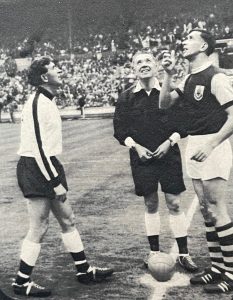
With Burnley skipper Jimmy Adamson at Wembley
But a season which started with victory over an F. A. XI in the Charity Shield ended with a second successive F. A. Cup. This time Birmingham City, Plymouth Argyle, West Bromwich Albion, Aston Villa and Manchester United were seen off with 21 goals scored in the run to Wembley. There, Burnley were the victims with Greaves and Smith putting the North Londoners 2-1 up before a late Blanchflower penalty clinched it.

Danny scores from the spot in the Cup final
They also came tantalisingly close to European Cup glory. Spurs scored 18 times in beating Gornik Zabrze, Feyenoord and Dukla Prague before falling to a somewhat unlucky 4-3 semi-final defeat to eventual winners Benfica.
After another Charity Shield win, this time thumping Ipswich 5-1, to the kick-off the 1962-63 season, Spurs again went close in the league, this time finishing runners-up to Everton. F. A. Cup hopes disappeared early with Burnley gaining 3rd round revenge for their Wembley defeat eight months before but Blanchflower and his teammates made amends when becoming the first English team to taste European glory.
Spurs were imperious in the early rounds of the European Cup Winners’ Cup, sweeping aside Rangers 8-4 on aggregate then dispatching Slovan Bratislava, a 6-0 win at White Hart Lane comfortably erasing a 2-0 deficit from the away leg.
The semi-final saw OFK Belgrade sent packing 5-2 on aggregate to set up a final encounter with Atletico Madrid in Rotterdam.
After a long season the pitch at the Feyenoord Stadium was threadbare but Blanchflower quickly brushed aside any worries saying; “There’s nothing wrong with it. It will do”.
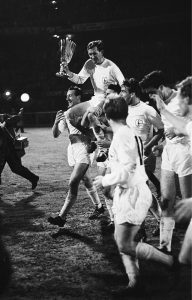
A lap of honour after ‘Our greatest triumph’
And despite being without the injured Mackay, Spurs proved their skipper right. A brace each from Jimmy Greaves and Terry Dyson along with one for John White gave them a 5-1 win with Blanchflower saying; “This was our greatest triumph. The boys played magnificently”.
Danny had played only 29 league during the 1962-63 and that number lessened even more during the following campaign with Bill Nicholson signing Alan Mullery as a long-term replacement for the now 38-year-old. The team suffered a serious blow when playmaker John White tragically passed away after being struck by lightning and would never again reach the heights of the early 1960s.
Blanchflower joined the coaching staff at White Hart Lane and was seen by many, including Nicholson, as the manager’s long-term replacement. He came back for a short playing spell in South Africa in 1965 and started taking on media responsibilities as Nicholson showed no sign of stepping down as Spurs boss.
In fact Nicholson would stay in the job until 1974 by which time Danny was long gone, focusing on his role as a sports writer with the Daily Express. He was Northern Ireland manager from 1976-79 and did have a brief stab at a club manager’s role with Chelsea in 1978 but after only five wins in 32 matches, he went back to journalism although his passion for the game seemed rooted in a previous era with one comment, that a match was; “All action and no plot” summing up his thoughts. before retiring.
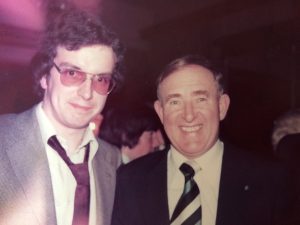
The writer with Danny
It was during his time as Chelsea boss that I was lucky enough to meet Danny and he spoke eloquently and at length about a game he clearly retained a deep passion for but clearly felt had lost some of its romance.

The benefit match
Spurs held a benefit match for Blanchflower in 1990 where they beat Northern Ireland 2-1 thanks to a Paul Gascoigne ‘rabona’ penalty. By this time he had been diagnosed with both Alzheimer’s and Parkinson’s disease and a huge number of White Hart Lane greats, including former manager Nicholson were there to pay their respects to the Northern Irishman.
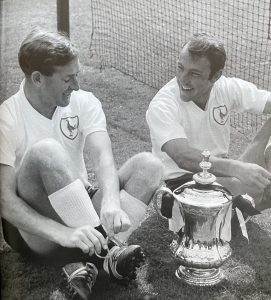
Danny with Jimmy Greaves
He spent his final years in a care home in Staines before passing away in December 1993 at the age of 67 with former teammate Jimmy Greaves saying on his passing; “A light went out at White Hart Lane”.
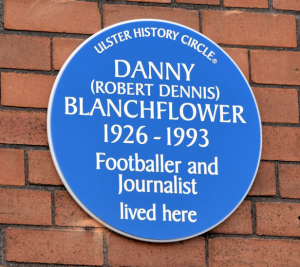
In 2015 a blue plaque was unveiled by Danny’s daughter Gayle in the presence of another daughter, Susie, Pat Jennings and others outside his childhood home in Grace Avenue, East Belfast, a fitting tribute to a man who made a huge impact on Northern Irish, and North London football.
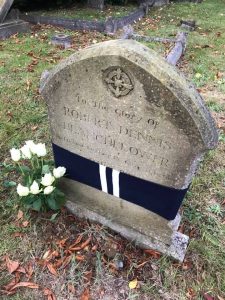
Rest in Peace Danny

